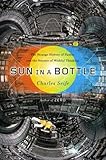The Ten Most Beautiful Experiments, by George Johnson is a favorite. Johnson, the New York Time science writer describes the often surprising moments of insight that brought us some of our greatest breakthroughs, from Galileo to Galvini.
Time science writer describes the often surprising moments of insight that brought us some of our greatest breakthroughs, from Galileo to Galvini.
 Time science writer describes the often surprising moments of insight that brought us some of our greatest breakthroughs, from Galileo to Galvini.
Time science writer describes the often surprising moments of insight that brought us some of our greatest breakthroughs, from Galileo to Galvini.
Sun in a Bottle: The Strange History of Fusion and the Science of Wishful Thinking, by Charles Seife (the author of Zero,) tells a story -- ongoing -- of man's quest to master the power of the sun, or at the very least, understand it.
 Michio Kaku, who's earlier Hyperspace was a favorite a few seasons back, has written a wonderful new book on the border between modern science and science fiction -- Physics of the Impossible: A Scientific Exploration into the World of Phasers, Force Fields, Teleportation, and Time Travel.
Michio Kaku, who's earlier Hyperspace was a favorite a few seasons back, has written a wonderful new book on the border between modern science and science fiction -- Physics of the Impossible: A Scientific Exploration into the World of Phasers, Force Fields, Teleportation, and Time Travel.Two beloved skeptics have new books out, both as necessary and entertaining as any either has offered before. Robert L. Park, whose Voodoo Science was one of the best defenses of the rational in the face of the ongoing onslaught of goofy pseudoscience still so popular today, has written a new book Superstition: Belief in the Age of Science. Perfect for defending one's self
offered before. Robert L. Park, whose Voodoo Science was one of the best defenses of the rational in the face of the ongoing onslaught of goofy pseudoscience still so popular today, has written a new book Superstition: Belief in the Age of Science. Perfect for defending one's self against the fire-breathing Aunts when attendance at early morning Christmas services are being insisted upon. And Michael Shermer, the publisher of Skeptic Magazine, and a hero, has The Mind of the Market: Compassionate Apes, Competitive Humans, and Other Tales from Evolutionary Economics.
against the fire-breathing Aunts when attendance at early morning Christmas services are being insisted upon. And Michael Shermer, the publisher of Skeptic Magazine, and a hero, has The Mind of the Market: Compassionate Apes, Competitive Humans, and Other Tales from Evolutionary Economics.
 offered before. Robert L. Park, whose Voodoo Science was one of the best defenses of the rational in the face of the ongoing onslaught of goofy pseudoscience still so popular today, has written a new book Superstition: Belief in the Age of Science. Perfect for defending one's self
offered before. Robert L. Park, whose Voodoo Science was one of the best defenses of the rational in the face of the ongoing onslaught of goofy pseudoscience still so popular today, has written a new book Superstition: Belief in the Age of Science. Perfect for defending one's self against the fire-breathing Aunts when attendance at early morning Christmas services are being insisted upon. And Michael Shermer, the publisher of Skeptic Magazine, and a hero, has The Mind of the Market: Compassionate Apes, Competitive Humans, and Other Tales from Evolutionary Economics.
against the fire-breathing Aunts when attendance at early morning Christmas services are being insisted upon. And Michael Shermer, the publisher of Skeptic Magazine, and a hero, has The Mind of the Market: Compassionate Apes, Competitive Humans, and Other Tales from Evolutionary Economics. A surprise bestsellers from our "Books That Scare Us" display for Halloween, Frank Close's new book The Void, is described as "an exploration of nothing." Look into it.
A surprise bestsellers from our "Books That Scare Us" display for Halloween, Frank Close's new book The Void, is described as "an exploration of nothing." Look into it.
Everyday Survival: Why Smart People Do Stupid Things, by Laurence Gonzales, offers a scientific perspective on the everyday, seemingly harmless dangers of daily life. Is that a stick on the ground, or a snake?
 And finally, The Alchemy of Air: A Jewish Genius, a Doomed Tycoon, and the Scientific Discovery That Fed the World but Fueled the Rise of Hitler, by Thomas Hager, tells a remarkable story of the great glory and unintended consequences of scientific discovery.
And finally, The Alchemy of Air: A Jewish Genius, a Doomed Tycoon, and the Scientific Discovery That Fed the World but Fueled the Rise of Hitler, by Thomas Hager, tells a remarkable story of the great glory and unintended consequences of scientific discovery.





No comments:
Post a Comment
Thanks for your comment! We love hearing from you.